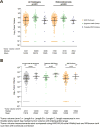Epigenetic silencing of MLH1 in endometrial cancers is associated with larger tumor volume, increased rate of lymph node positivity and reduced recurrence-free survival
- PMID: 28709704
- PMCID: PMC5601318
- DOI: 10.1016/j.ygyno.2017.07.003
Epigenetic silencing of MLH1 in endometrial cancers is associated with larger tumor volume, increased rate of lymph node positivity and reduced recurrence-free survival
Abstract
Objectives: To determine the relationship between mismatch repair (MMR) classification and clinicopathologic features including tumor volume, and explore outcomes by MMR class in a contemporary cohort.
Methods: Single institution cohort evaluating MMR classification for endometrial cancers (EC). MMR immunohistochemistry (IHC)±microsatellite instability (MSI) testing and reflex MLH1 methylation testing was performed. Tumors with MMR abnormalities by IHC or MSI and MLH1 methylation were classified as epigenetic MMR deficiency while those without MLH1 methylation were classified as probable MMR mutations. Clinicopathologic characteristics were analyzed.
Results: 466 endometrial cancers were classified; 75% as MMR proficient, 20% epigenetic MMR defects, and 5% as probable MMR mutations. Epigenetic MMR defects were associated with advanced stage, higher grade, presence of lymphovascular space invasion, and older age. MMR class was significantly associated with tumor volume, an association not previously reported. The epigenetic MMR defect tumors median volume was 10,220mm3 compared to 3321mm3 and 2,846mm3, for MMR proficient and probable MMR mutations respectively (P<0.0001). Higher tumor volume was associated with lymph node involvement. Endometrioid EC cases with epigenetic MMR defects had significantly reduced recurrence-free survival (RFS). Among advanced stage (III/IV) endometrioid EC the epigenetic MMR defect group was more likely to recur compared to the MMR proficient group (47.7% vs 3.4%) despite receiving similar adjuvant therapy. In contrast, there was no difference in the number of early stage recurrences for the different MMR classes.
Conclusions: MMR testing that includes MLH1 methylation analysis defines a subset of tumors that have worse prognostic features and reduced RFS.
Keywords: DNA mismatch repair; Endometrial cancer; Epigenomics; Lymph node excision; Lynch syndrome.
Copyright © 2017 Elsevier Inc. All rights reserved.
Conflict of interest statement
Figures



References
-
- Siegel RL, Miller KD, Jemal A. Cancer Statistics, 2017. CA Cancer J Clin. 2017;67:7–30. - PubMed
-
- Ries LAG, Young JL, Keel GE, Eisner MP, Lin YD, Horner MJ. Patient and Tumor Characteristics. National Cancer Institute, SEER Program, NIH Pub. No. 07-6215; Bethesda, MD: 2007. SEER Survival Monograph: Cancer Survival Among Adults: U.S. SEER Program, 1988–2001.
-
- Lancaster JM, Powell CB, Chen LM, Richardson DL. Society of Gynecologic Oncology statement on risk assessment for inherited gynecologic cancer predispositions. Gynecol Oncol. 2015;136:3–7. - PubMed
-
- Aarnio M, Sankila R, Pukkala E, Salovaara R, Aaltonen LA, De La Chapelle A, et al. Cancer risk in mutation carriers of DNA-mismatch-repair genes. International Journal of Cancer. 1999;81:214–218. - PubMed
-
- Hampel H, Stephens JA, Pukkala E, Sankila R, Aaltonen LA, Mecklin JP, et al. Cancer risk in hereditary nonpolyposis colorectal cancer syndrome: later age of onset. Gastroenterology. 2005;129:415–421. - PubMed
Publication types
MeSH terms
Substances
Grants and funding
LinkOut - more resources
Full Text Sources
Other Literature Sources
Medical

